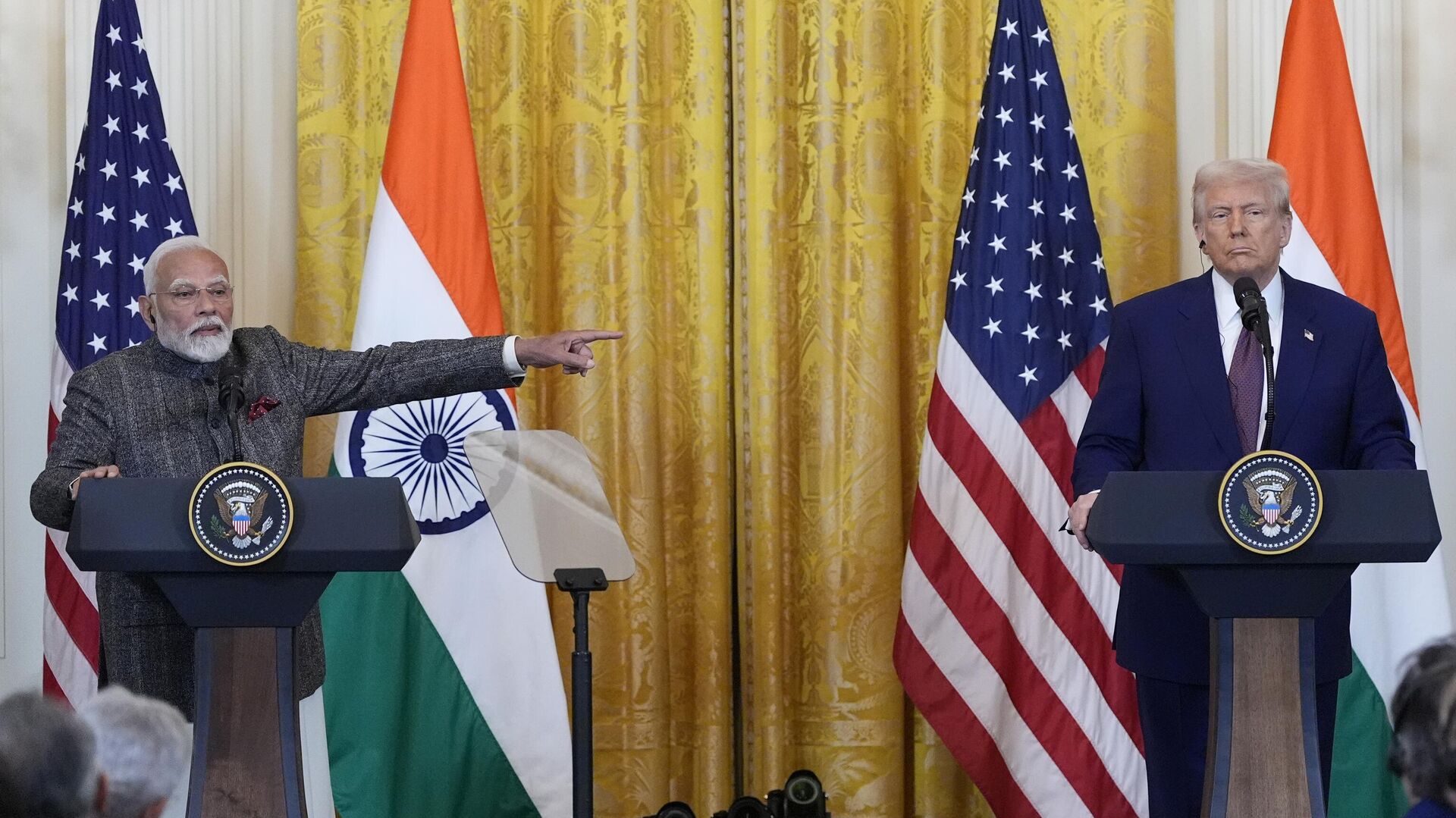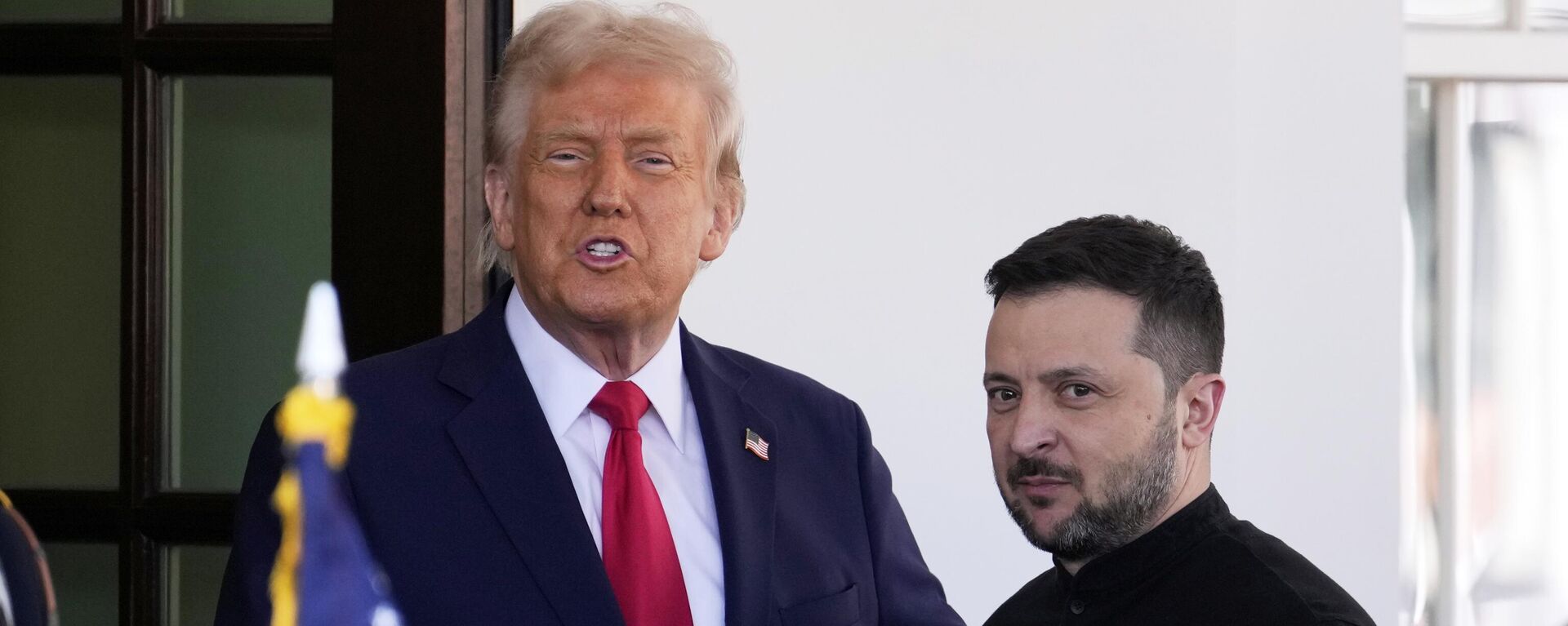https://sputniknews.in/20250716/india--wont-be-bulldozed-no-room-for-nato-or-us-hegemony-in-trade---bjp-politician-9456702.html
'India Won’t Be Bulldozed': No Room for NATO or US Hegemony in Trade - BJP Politician
'India Won’t Be Bulldozed': No Room for NATO or US Hegemony in Trade - BJP Politician
Sputnik India
Western countries, particularly the US, have repeatedly threatened India with dire consequences, including sanctions, if it does not sever trading relations... 16.07.2025, Sputnik India
2025-07-16T20:50+0530
2025-07-16T20:50+0530
2025-07-17T11:17+0530
sputnik opinion
india
russia
us
nato
bharatiya janata party (bjp)
mim-104 patriot missile
moscow
delhi
new delhi
https://cdn1.img.sputniknews.in/img/07e9/02/0e/8774418_0:0:3068:1725_1920x0_80_0_0_3dd95f0bac83984d2e2a1c7afab1818f.jpg
NATO Secretary General Mark Rutte and US President Donald Trump have threatened India with severe economic penalties if it does not end business ties with Russia."My encouragement to these three countries, particularly, is: if you live now in Beijing, or in Delhi, or you are the president of Brazil, you might want to take a look into this, because this might hit you very hard," he added.Previously, Trump warned that 100% secondary tariffs were to be imposed on countries that purchase energy products from Russia, in what was seen as an oblique reference to China and India. The two Asian giants have been the largest importers of Russian oil for more than 24 months.In June 2025, India's crude imports from Russia reached an 11-month high. Russia's share in India's oil basket surged to 43.2 percent, more than the combined supplies from the next three suppliers—Iraq, Saudi Arabia, and the UAE, according to global analytics firm Kpler.In that same month, 2.08 million barrels per day (bpd) of Russian oil were shipped to India, the highest figure recorded since July 2024 and 12.2% higher than the previous month of May.Interestingly, India's top leadership, including External Affairs Minister (EAM) S Jaishankar and Petroleum and Natural Gas Minister Hardeep Singh Puri, have continuously hit out at the West for exerting pressure on India for its Russian crude purchases.Last week, Puri highlighted that global oil prices would have surged to over $120-130 per barrel if Russian crude had been removed from the world's supply chain.Underlying that India was a "net positive contributor to global energy price stability", he took a dig at India's critics, especially Western nations, including the US, who have often targeted India's purchase of Russian oil.Moreover, experts stress that Russian oil has helped India keep inflation and prices of essential commodities in check, thus making a significant contribution to the country's economy, which is currently the globe's fastest-growing major economy.For the unversed, RSS is the ideological mentor of the Bharatiya Janata Party (BJP), India's ruling party at present.For a long time, the US has been trying to dictate India not to buy oil from Russia. However, India's imports have helped keep global crude prices lower, preventing them from reaching critical levels, as noted by Petroleum Minister Hardeep Puri, the observer echoed.Also, India's oil purchases from Russia have helped control inflation globally, assisting households across the planet to survive during such times when Europe, in particular, has struggled with a cost-of-living crisis, he highlighted.NATO or America's threats of tariffs were an attack on the strategic autonomy of India's foreign policy, Gulrez Sheikh, a BJP politician and the spokesperson of the political outfit's Madhya Pradesh unit, told Sputnik India.He suggested that the US efforts against nations like India, Russia and China were leading to a vertical split between the Global South and Global North, claiming that something of this sort did not happen even during the Cold War, when the world was divided between pro-American and pro-Soviet camps.Furthermore, the strategic affairs pundit cast doubts on the present US government on the matter, labelling it the "U-turn and flip-flop administration", putting focus on Trump's previous volte-faces on several issues, including the Russia-Ukraine conflict.Months before Trump returned to the Oval Office for a second term, he vowed to end the Russia-Ukraine conflict within "24 hours", but has now committed to supply weapons, including the Patriot missile system, to Kiev.
https://sputniknews.in/20250716/us-arms-scheme-to-ukraine-is-business-europe-shows-extreme-hawkishness---kremlin-9455358.html
india
russia
us
moscow
delhi
new delhi
ukraine
kiev
china
Sputnik India
feedback.hindi@sputniknews.com
+74956456601
MIA „Rossiya Segodnya“
2025
Pawan Atri
https://cdn1.img.sputniknews.in/img/07e6/0c/13/139630_147:0:831:684_100x100_80_0_0_8fa2b25903e7787fe6a2698552c167df.png
Pawan Atri
https://cdn1.img.sputniknews.in/img/07e6/0c/13/139630_147:0:831:684_100x100_80_0_0_8fa2b25903e7787fe6a2698552c167df.png
News
en_IN
Sputnik India
feedback.hindi@sputniknews.com
+74956456601
MIA „Rossiya Segodnya“
Sputnik India
feedback.hindi@sputniknews.com
+74956456601
MIA „Rossiya Segodnya“
Pawan Atri
https://cdn1.img.sputniknews.in/img/07e6/0c/13/139630_147:0:831:684_100x100_80_0_0_8fa2b25903e7787fe6a2698552c167df.png
india, russia, us, nato, bharatiya janata party (bjp), mim-104 patriot missile, moscow, delhi, new delhi, ukraine, kiev, sanctions, western sanctions, donald trump, government of india, china
india, russia, us, nato, bharatiya janata party (bjp), mim-104 patriot missile, moscow, delhi, new delhi, ukraine, kiev, sanctions, western sanctions, donald trump, government of india, china
'India Won’t Be Bulldozed': No Room for NATO or US Hegemony in Trade - BJP Politician
20:50 16.07.2025 (Updated: 11:17 17.07.2025) Western countries, particularly the US, have repeatedly threatened India with dire consequences, including sanctions, if it does not sever trading relations with Russia.
NATO Secretary General Mark Rutte and US President Donald Trump have threatened India with severe economic penalties if it does not end business ties with Russia.
"If you are the President of China, the Prime Minister of India, or the President of Brazil, and you continue to trade with Russia and buy their oil and gas, then you know: if the man in Moscow doesn't take the peace negotiations seriously, I will impose 100% secondary sanctions," Rutte told media persons after meeting US lawmakers on Tuesday.
"My encouragement to these three countries, particularly, is: if you live now in Beijing, or in Delhi, or you are the president of Brazil, you might want to take a look into this, because this might hit you very hard," he added.
Previously, Trump warned that 100% secondary tariffs were to be imposed on countries that purchase energy products from Russia, in what
was seen as an oblique reference to China and India. The two Asian giants have been the largest importers of Russian oil for more than 24 months.
"We're going to be doing very severe tariffs if we don't have a deal in 50 days, tariffs at about 100% — you'd call them secondary tariffs," Trump said in a press conference at the White House.
In June 2025, India's crude imports from Russia reached an 11-month high. Russia's share in India's oil basket surged to 43.2 percent, more than the combined supplies from the next three suppliers—Iraq, Saudi Arabia, and the UAE, according to global analytics firm Kpler.
In that same month, 2.08 million barrels per day (bpd) of Russian oil were shipped to India, the highest figure recorded since July 2024 and 12.2% higher
than the previous month of May.
Interestingly, India's top leadership, including External Affairs Minister (EAM) S Jaishankar and Petroleum and Natural Gas Minister Hardeep Singh Puri, have continuously hit out at the West for exerting pressure on India for its Russian crude purchases.
Last week, Puri highlighted that global oil prices would have surged to over $120-130 per barrel if Russian crude had been removed from the world's supply chain.
"Russia is one of the largest crude producers with over 9 million barrels/day. Imagine the chaos if this oil, amounting to about 10% of the global oil supply of around 97 million, vanished from the market. It would have forced the world to reduce its consumption, and since the consumers would be chasing the reduced supplies, the prices would’ve spiralled to over $120-130," Puri wrote in a post on X.
Underlying that India was a "net positive contributor to global energy price stability", he took a dig at India's critics, especially Western nations, including the US, who
have often targeted India's purchase of Russian oil.
"Some commentators who do not have an understanding of the dynamics of energy markets pass unnecessary judgements on our policies. Russian oil was never under global sanctions. Sensible decision makers around the world were aware of the realities of global oil supply chains and how India was only helping the global markets," Puri stressed.
Moreover, experts stress that Russian oil has helped India keep inflation and prices of essential commodities in check, thus making a significant contribution to the country's economy, which is currently the globe's fastest-growing major economy.
"Why should India give importance to the NATO chief's statement when that person has no connection with tariffs. It is not his cup of tea in any case," Ashwani Mahajan, an economist and the national co-convener of Swadeshi Jagaran Manch (SJM), a Rashtriya Swayamsevak Sangh (RSS) affiliate, told Sputnik India.
For the unversed, RSS is the ideological mentor of the Bharatiya Janata Party (BJP), India's ruling party at present.
For a long time, the
US has been trying to dictate India not to buy oil from Russia. However, India's imports have helped keep global crude prices lower, preventing them from reaching critical levels, as noted by Petroleum Minister Hardeep Puri, the observer echoed.
Also, India's oil purchases from Russia have helped control inflation globally, assisting households across the planet to survive during such times when Europe, in particular, has struggled with a cost-of-living crisis, he highlighted.
"India is doing service to humanity by buying oil from Russia, along with protecting its national interest. While some sections of countries are not happy about it, India can't keep everybody happy. Threats or no threats, India will continue to buy oil from wherever it gets it cheaper," Mahajan underscored.
NATO or America's threats of tariffs were an attack on the strategic autonomy of India's foreign policy, Gulrez Sheikh, a BJP politician and the spokesperson of the political outfit's Madhya Pradesh unit, told Sputnik India.
"NATO and the US are in no position to dictate India's trade policies. Like in the past, India will not be bulldozed by America's hegemonic tendencies and will keep its foreign policy free from any kind of interference, irrespective of the severe pressure the Trump administration has been trying to exert on New Delhi," Sheikh, who is also a geopolitical commentator, said.
He suggested that the US efforts against nations like India, Russia and China were leading to a vertical split between the Global South and Global North, claiming that something of this sort did not happen even during the Cold War, when the world was divided between pro-American and pro-Soviet camps.
Furthermore, the strategic affairs pundit
cast doubts on the present US government on the matter, labelling it the
"U-turn and flip-flop administration", putting focus on Trump's previous volte-faces on several issues, including the Russia-Ukraine conflict.
Months before Trump returned to the Oval Office for a second term, he vowed to end the Russia-Ukraine conflict within "24 hours", but has now committed to supply weapons, including the Patriot missile system, to Kiev.
"Trump and his aides form an administration of U-turns, who have reverted on so many occasions that nobody knows what will happen tomorrow, so it is difficult to predict anything at the moment," Sheikh concluded.



